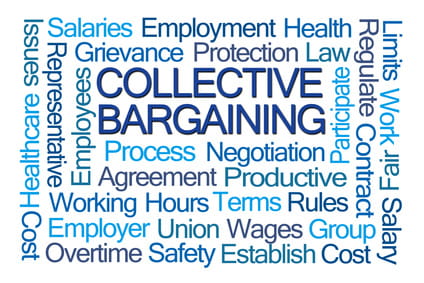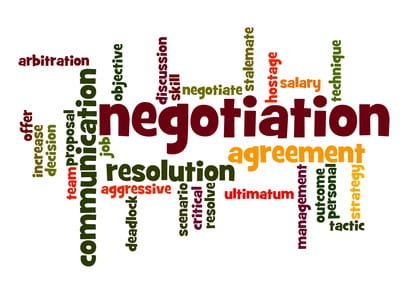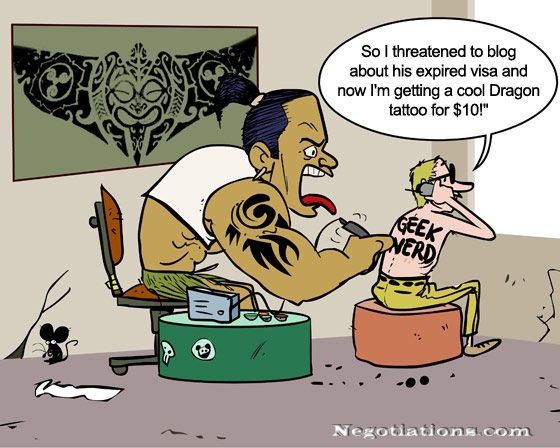Resources
We hope that business negotiators find what they're searching for in our free resources. This is the next best thing to coming to one of our negotiation training courses.

Negotiation Course Defence

Power in Negotiation
Components of Successful Negotiations There are many occasions when a smaller company will want to form a negotiation partnership with a larger organization to further their business objectives. There are two hurdles that the smaller company might have to overcome to succeed in the negotiation process. The first problem is to get the larger organization’s attention, as they may express little or no interest in the partnership. The second problem revolves around the prickly

Salary Negotiation
Salary negotiation is a process where one party (usually the employee) negotiates the amount of their pay, income, earnings, commission, salary, wages, wage remuneration, annual review, or salary raise with another party (usually a representative of the employer, such as their manager).

Positional Negotiation
It is always a difficult task for a negotiator to deal with people who approach negotiation as if it was a competition, with only one possible win-lose outcome. However, difficult does not mean impossible. As in any negotiation process, one of the most important tasks for you would be to discover and identify the other sides values and underlying needs. If you are aware of the reason behind the other sides behaviour, you are more likely to be able to effect changes in his behaviour

Collective Bargaining Union Negotiation
Collective bargaining negotiation between labor unions and corporate employers is a specialized area in the field of general negotiations. However, the underlying legal and relationship aspects make these areas distinct. General business negotiation and lawsuit negotiations are not regulated by statutory provisions. In contrast, external laws mandate and govern a collective bargaining negotiation. Who Governs the Different Bargaining Situations? Many different

Selling War

Kuwait Invasion Negotiation Perspective
On a scorching summer day in August 1990, the citizens of Kuwait stared in puzzlement then fear at the encroaching dusty streams of what appeared to be a pending desert sandstorm. To their dismay and horror filled eyes, the quaking citizenry had become helpless witnesses to the advancing forces of once CIA asset Saddam Hussein's Iraqi army. Kuwaiti resistance was swept aside much like one casually brushes away a crumb from one’s lapel. Kuwait had been drilling laterally into

Risk-Seeking
A high level or approach in the amount of risk that a negotiator is prepared to accept in a negotiation.. A negotiator who decides to gamble rather than accept the ‘sure thing’, and who has the expectation that they will gain more in a negotiation is said to be ‘risk-seeking’.

Negotiation School of Hard Knocks

Lehman Leadership Negotiation Rivalry
Many people like to believe that the people in charge of the organizations that employ them are always working as a skillful trained negotiation team, united in working towards achieving unified goals and objectives. We like to believe that our management team has our company's best interests at heart. Well, sorry to stick a pin in this balloon, this case study illustrates a contrasting example. Situations such as the one shared in this case study occurs more often than many

Risk-Averse
A low level or approach in the amount of risk that a negotiator is prepared to accept in a negotiation. A negotiator who decides to accept the "sure thing" where a result is certain to be achieved is said to be "risk-averse", and is not willing to gamble further on a potential negotiated result.

Effective Negotiation Techniques
Your answer should be in line with the goals that management should aim for in developing any company-wide strategy or vision. Every negotiator should take responsibility in developing his or her own tool-kit of effective negotiation skills techniques. An effective negotiator: Aligns negotiation goals (strategy) with organisational goals (strategy), Prepares thoroughly and uses each negotiating phase to prepare techniques further, Uses negotiation meeting to discover

Giving Feedback After a Negotiation
Smart people ask us: “How do I give feedback to my colleagues after a negotiation?” Giving feedback to colleagues can be a delicate topic. As such, feedback is an area we invest plenty of time into during our negotiation skills training seminars. With this in mind, we thought you would like to know Steve Jones' top seven points on how to offer feedback. 1. Give the feedback immediately After the meeting has finished, give your feedback straight away. It's far easier for people

Buying Real Estate

Chinese Water Selling Negotiation
Overview Acqua International (AQ) is a Europe-based multinational company that has interests in water and other environment-related businesses. In China, the company has joint ventures with medium-size and large municipalities to produce and sell potable water. To increase its investments in China, the AQ Group arranged, through its local subsidiary Pacific Acqua International (PAQ), to enter into a strategic alliance with Tak Foy and Co., a Chinese conglomerate with

Reservation Price
The reservation price is the least favourable point at which you will accept a negotiated agreement. For example, for a seller this means the least amount (minimum) or bottom line they would be prepared to accept. For a buyer, it would mean the most (maximum) or bottom line that they would be prepared to pay. It is also sometimes referred to as the "walk-away" point.

Chinese Team Negotiation
Cross-cultural negotiation requires very detailed preparation on cultural differences. The history of business negotiation shows that many negotiations in China failed not because of lack of common ground but rather because of ignorance of cultural differences. Many western academics have commented that China sees herself as Chung-Kuo – the middle kingdom, the centre of the universe. This view states that the Chinese feel superior in the area of moral and spiritual

Value Creation in Negotiations
Our efforts to create value in any negotiation will be highly limited if we don't form a collaborative negotiation approach with the other side. We don’t want to find ourselves making a shaky agreement with an angry and resentful partner. Instead, we want to create a relationship that is solid and durable, and benefits everyone. The ideal scenario is to leave the table shaking hands, smiling, and feeling pleased that we worked together to make the best possible deal for both

Blackmail

Resolving Disputes Case Study: Business Mediation Example
Options to Resolve Business Disputes Companies that find themselves embroiled in a bitter feud over a contract dispute have three options to find a solution. They can either: Litigate their claim through the court system Go to arbitration Use a mediation process to resolve the dispute Many companies have invariably used one of these processes to address a dispute. There are significant differences to consider before deciding upon which method to employ. Arbitration and



